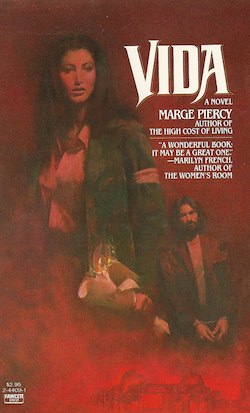Vida (1980) isn’t science fiction, it’s a mainstream novel about a woman who was part of the sixties revolutionary movement in the US and has been on the run for years. It’s an intensely nested book—there are sections set in the sixties and sections set in the “present,” which I take to be about the time of writing. But even without that, Vida herself is constantly thinking about her past, hoping for the future, remembering, connecting. What the book is doing is the story of the almost forty years of her life that gets her to the point where she is, living as a fugitive. She has been a terrorist—the imaginary group she belonged to resembles the real Weather Underground movement. But there’s a lot less about politics in this book than you might expect, and a lot more about food and love.
The great thing about Marge Piercy is her wonderfully real and contexted characters. All her characters are real, and they’re all grounded in their experience. Vida here is realising that the choices she has made have left her irrelevant not just politically but personally—her husband is marrying and having a baby with someone else, she is trapped with the other fugitives she increasingly dislikes, writing position papers nobody reads. She has false papers, a false name, she uses codes on the phone with her sister, she constantly has to appease people who are helping her. It’s very hard for her not to feel useless, because in fact she is useless, the revolution she was waiting for never happened, and she can’t be with the people she loves. And the other characters are just as real and well developed, even the minor characters.
This is definitely a book I reread to hang out with the people. But they’re not people having fun, and there are no happy endings—especially if you try thinking about what might have happened to them since 1983. It’s a portrait of a moment that became a backwater, and that’s interesting in itself, interesting in an SFnal way. This isn’t the kind of historical moment people write historical novels about. It makes an interesting contrast with Martin’s Armageddon Rag (post) in which the missed path of the sixties is coming back. Though Piercy has written SF, she’s limiting herself here to the real world and real history, which means Vida’s life and her movement are inevitably sidelined. That’s interesting in itself.
I picked this up to reread now because I’d been reading the Foundation books and I was thinking about historical destiny and going against the tide. Vida is a rare example of a mainstream book that is directly about trying to change society. Vida and her friends are prepared to bomb corporations and also are trying to change people’s minds, and change the way they themselves live—the relations between men and women and the way they are socially shaped sometimes against the conscious will of the individuals involved. I said “love and food” as opposed to politics, but this is a book where love and food are part of hoping to change society.
Unlike Hari Seldon, Vida doesn’t make a new better world from the ruins of the old. I’m actually very unsure that it would be possible to do so using her methods, or that her world would be particularly desirable. I think Piercy does very well with making people one would naturally think one would automatically dislike into complex people with whom it’s possible to sympathise. But the sidelined revolutionaries are thinking about putting out another position paper nobody will read, and some of them are taking comfort in advances in other countries. I’m not sure Seldon’s methods would have worked any better, or that his ideals are any nicer.
It was hard to concentrate on the societal change aspect. I kept visiting with the characters and getting caught up in the details of the story. I hadn’t read the book in a long time and I’d forgotten a lot of it—I found reading it absorbing—Piercy always has the “I want to read it” nature for me.
So, an interesting read. I’m going to be going on thinking about some other things that see social engineering of society as a positive thing.
Jo Walton is a science fiction and fantasy writer. She’s published two poetry collections and nine novels, most recently Among Others, and if you liked this post you will like it. She reads a lot, and blogs about it here regularly. She comes from Wales but lives in Montreal where the food and books are more varied.










